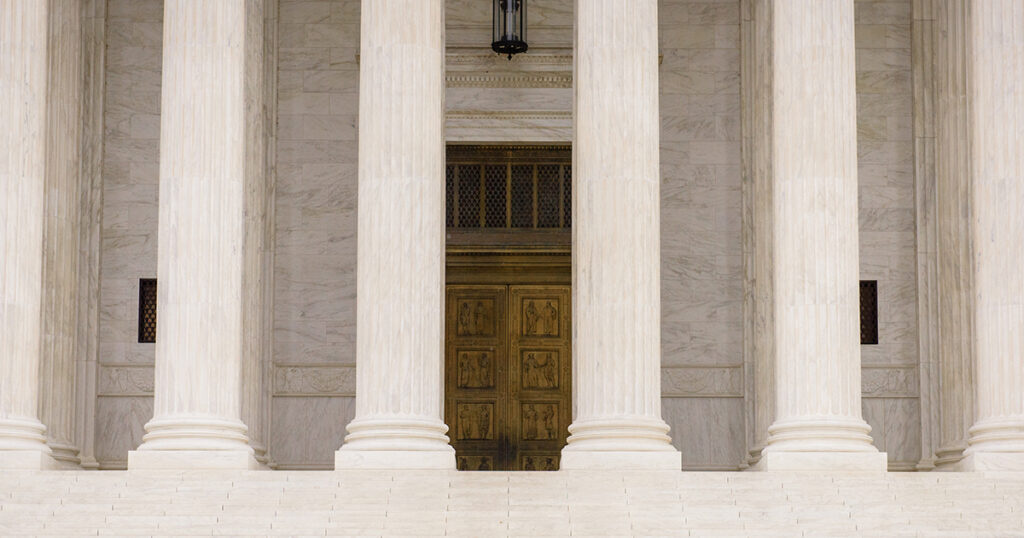Protesters began their vandalization of statues by concentrating on Confederate heroes, then they targeted slave-owning Founding Fathers. But the frenzy of destruction turned against historical monuments in general, including abolitionists, Abraham Lincoln and black soldiers who fought in the Civil War.
This new wave of vandalism did not spare Christian monuments. Across the country, statues of Jesus, the Virgin Mary and various saints — not on public land but on church property — have been defaced by graffiti, torn down or decapitated.
According to one activist, “All murals and stained glass windows of white Jesus, and his European mother, and their white friends should also come down. They are a gross form of white supremacy.”
His point was that Jesus, as a person from the Middle East, probably had brown skin. Depictions of Him as white, therefore, express white supremacy. Art history, however, shows Christians of all races and cultures — including Africans and African Americans — have portrayed Jesus as someone like themselves.
But the attacks on religious symbols might not be directly related to the Black Lives Matter protests. This is a wave that started in Europe, long before America’s current unrest.
They are not protesting so much as expressing their hatred of Christianity.
In 2018, there were 877 similar acts of vandalism and desecration in churches and cemeteries in France, and the rate has been accelerating ever since. The phenomenon has spread to other European countries and has evidently crossed the ocean to the United States, where it found a receptive climate.
Most of the perpetrators who have been caught turn out to be Satanists, radical Muslims, neo-Nazis and anarchists. They are not protesting so much as expressing their hatred of Christianity.
That hatred is becoming explicit in the United States — not just in smashing statues but in direct expressions of hostility. The New Republic recently published a favorable review of three anti-Christian diatribes, concluding that “we cannot separate evangelicalism from the racism, sexism, and xenophobia that gave rise to the movement over a century ago.”
The problem with that analysis is that black Americans, women and developing nations are the most evangelical demographics. Black Americans show the highest levels of religious commitment, as measured by Christian affiliation, church attendance, certainty of God’s existence and belief in the Bible. (This is evident with the black Lutherans of the LCMS.) Studies show that women are much more religious than men, with higher rates of belief, church attendance and spiritual practices such as prayer. And Christianity is growing like wildfire in the developing world.
To be sure, American Christians should repent of their sins, of failing to live according to God’s will, even when the critics expose that failure. But they should not be surprised when they encounter hatred and persecution.
“If the world hates you,” said Jesus, “know that it has hated me before it hated you.If you were of the world, the world would love you as its own; but because you are not of the world, but I chose you out of the world, therefore the world hates you” (John 15:18–19).
When the church is not hated but is popular, it has probably fallen into worldliness, unfaithfulness and sin. But when it is hated because of its faithfulness, Jesus promises to bless the church:
Blessed are you when others revile you and persecute you and utter all kinds of evil against you falsely on my account. Rejoice and be glad, for your reward is great in heaven, for so they persecuted the prophets who were before you.
Matthew 5:11–12






Jesus also said, “Love your enemies, do good to those who hate you, bless those who curse you, pray for those who abuse you.” (Luke 6:27-28 ESV)
Christians can be reviled by those who understand the faith well enough to recognize that it challenges their own self-serving beliefs and way life. But we can also be reviled because of a misunderstanding of what our faith truly entails, in which case we might look for opportunities to correct “opponents with gentleness. God may perhaps grant them repentance leading to a knowledge of the truth, and they may come to their senses and escape from the snare of the devil, after being captured by him to do his will.” (2 Tim. 2:25-26 ESV)
“For what credit is it if, when you sin and are beaten for it, you endure? But if when you do good and suffer for it you endure, this is a gracious thing in the sight of God.” 1 Peter 2:20
Before we complain about being persecuted, we ought to examine our own conduct and actions as church body and examine whether we behaved in an unworthy manner, bringing this on our own heads. Had the LCMS boldly stood for the doctrinal truth that we declared in the 1994 CTCR Racism and the Church: Overcoming Idolatry, we could truly say that we were faithful. But alas, we did not. We did not light the candle of truth for the dark world. Rather we let our light be hid. Let it not be said of us that we are unwilling to repent and confront our sins head on. God, who is merciful and just, will forgive our sins and cleanse from all unrighteousness.
“The problem with that analysis is that black Americans, women and developing nations are the most evangelical demographics.”
Keep in mind that it isn’t meant as an analysis, and it isn’t meant to be logical. It is intended to be an effective message to accomplish the enemy’s purposes, which is to attack the church by sowing division between the faithful and disrupting evangelism among those peoples.